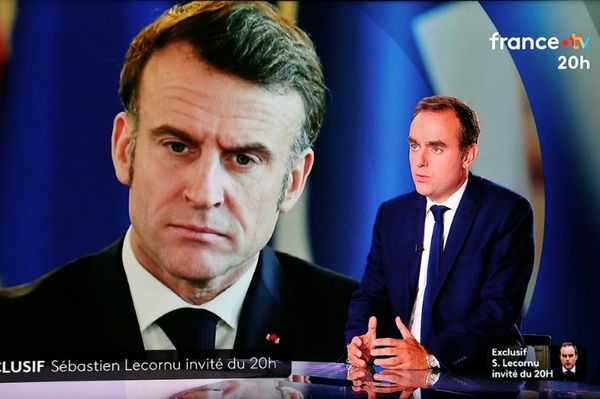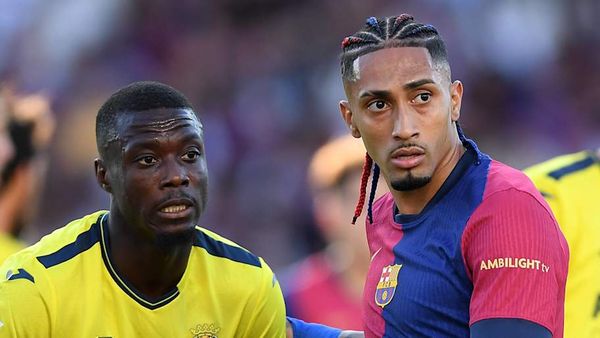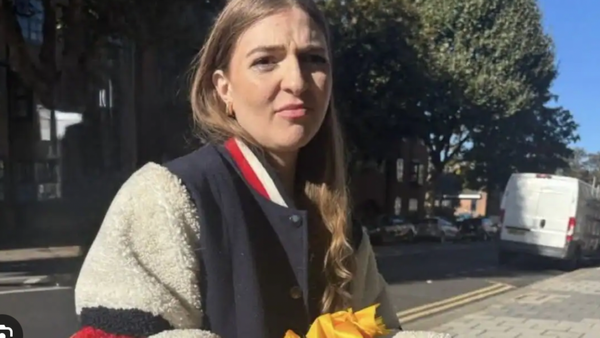Hours after France’s new prime minister resigned less than a month after he was appointed, Emmanuel Macron has asked him to stay on for two more days in a last-ditch effort to chart a way out of the country’s rapidly deepening political crisis.
The French president on Monday evening gave Sébastien Lecornu – who had earlier become the third prime minister of the EU’s second-biggest economy to quit in a year – 48 hours to “conduct final negotiations … to define a platform for action and stability”.
Lecornu said he would inform Macron by Wednesday evening “whether this is possible or not”. Government sources told French media that Macron would “assume his responsibilities” if the effort failed. It was not immediately clear what this might entail.
On Monday morning Lecornu made what he called a “spontaneous” speech on the steps of the prime minister’s residence in Paris, appearing to blame his resignation on opposition political parties in France, who he said had not wanted to compromise.
Criticising political “egos”, he said parties continued to behave with “partisan appetites”. He said he had been “ready to compromise, but each political party wanted the other political party to adopt its entire programme”.
Speaking in the courtyard of Matignon palace, the prime minister’s headquarters, the 39-year-old former defence minister, the shortest-lived premier in modern French history, said he had worked for weeks to forge a viable path forward.
“It would not take much for it to work,” added Lecornu, whose cabinet had been announced barely 12 hours previously. “By being more selfless for many, by knowing how to show humility … One must always put one’s country before one’s party.”
Lecornu’s decision had left Macron facing a choice between appointing a new prime minister – someone capable of passing a budget for this year – or dissolving the national assembly and calling fresh legislative elections, options that could still be available to him after Wednesday.
He has consistently said he is reluctant to hold another vote, which polls suggest would return another divided parliament or possibly usher in a far-right government, and has also said he will not resign until the end of his mandate in 2027.
Lecornu had faced furious criticism from opposition politicians as soon as the new government was revealed on Sunday evening to be virtually unchanged since his immediate predecessor, François Bayrou, was forced to quit last month over proposed budget cuts.
The proposed new government was dominated by Macron’s allies. Opposition parties said Lecornu had backtracked on the “profound break” with past politics that he had promised when he took over from Bayrou, who was ousted on 9 September.
His announcement alarmed markets, with the CAC 40 stock index dropping 2% and the euro 0.7%. France’s debt-to-GDP ratio is the EU’s third-highest and almost twice the ceiling permitted under EU rules, as is its projected budget deficit of nearly 6%.
Lecornu’s attempted departure compounded a political crisis that has rocked France since Macron dissolved parliament last summer and called legislative elections that ended in a hung parliament divided into three blocs: the left, the far right and Macron’s own centre-right alliance, with no group coming close to a clear majority.
The far-right National Rally (RN) of Marine Le Pen and Jordan Bardella called on Monday for the president to dissolve parliament again, while the radical left France Unbowed (LFI) reiterated its longstanding call for the president himself to step down.
Le Pen said it would be “wise” for Macron to resign, but also urged snap legislative polls as “absolutely necessary”. Bardella said he expected the legislative elections to take place and added: “The RN will obviously be ready to govern.”
Bardella, the RN’s president, said: “There cannot be a return to stability without a return to the ballot box. It was very clearly Emmanuel Macron who decided this government himself. He has understood nothing of the political situation we are in.”
Mathilde Panot of LFI said: “The countdown has begun. Macron must go.” David Lisnard, of the conservative Les Républicains (LR) party, which has thus far backed Macron as part of the governing alliance, was also among those who called on the president to leave.
LR’s vice-president, François-Xavier Bellamy, said the party was not going to offer Macron and his allies “a final lap”. The party’s leader and outgoing interior minister, Bruno Retailleau, was more cautious, saying the ball was now in Macron’s camp and he must speak soon.
Pierre Jouvet, the general secretary of the centre-left Socialist party (PS), said after a party meeting that it was “not calling for dissolution or the departure of the head of state, but for a solution”. That could come in the form of the “appointment of a prime minister from the left, open to compromise”, Jouvet said.
Macron’s allies and opponents had denounced the new cabinet lineup, with the return of Bruno Le Maire, a Macron ally and former economy minister, to government as defence minister particularly enraging politicians across the spectrum who saw him as the incarnation of Macron’s economic policies.
Le Maire said on Monday evening he was leaving the government in an effort to end the crisis. “Under these conditions, I proposed to the president to withdraw from the government without delay,” he said. “The president has accepted my proposal.”
Lecornu’s two immediate predecessors, Bayrou and Michel Barnier, were ousted over Macron-approved plans for an austerity budget. Pressure on the president to come up with a solution is mounting fast, with a budget for next year needing to be agreed within weeks.







